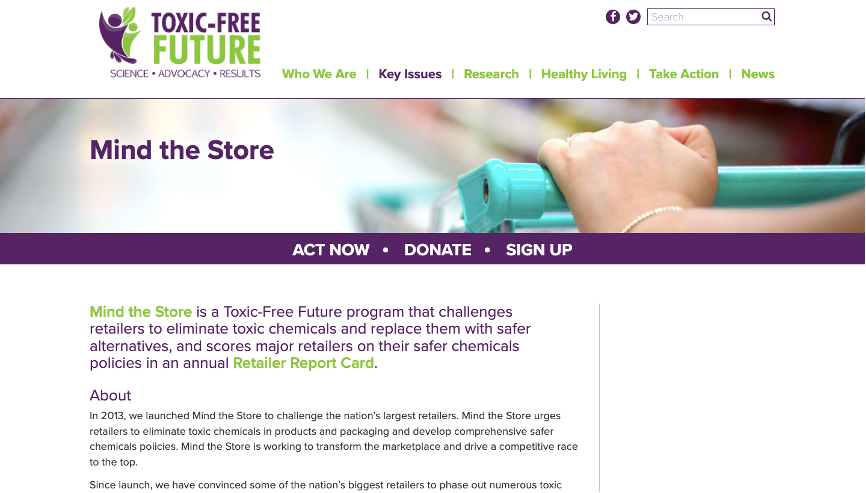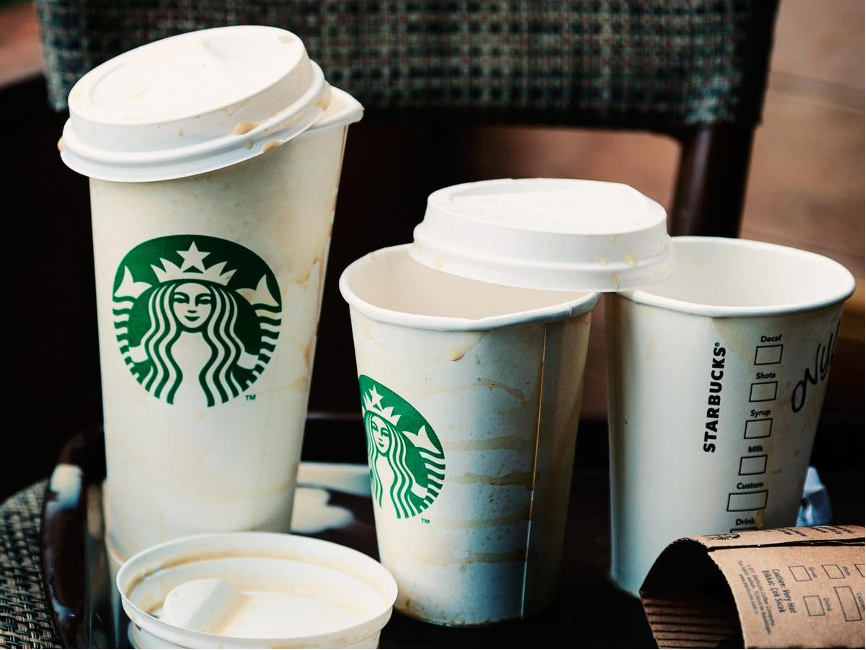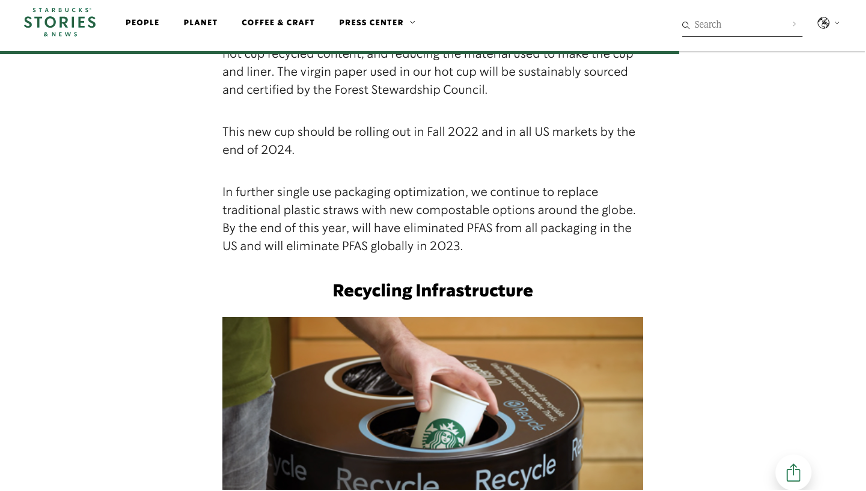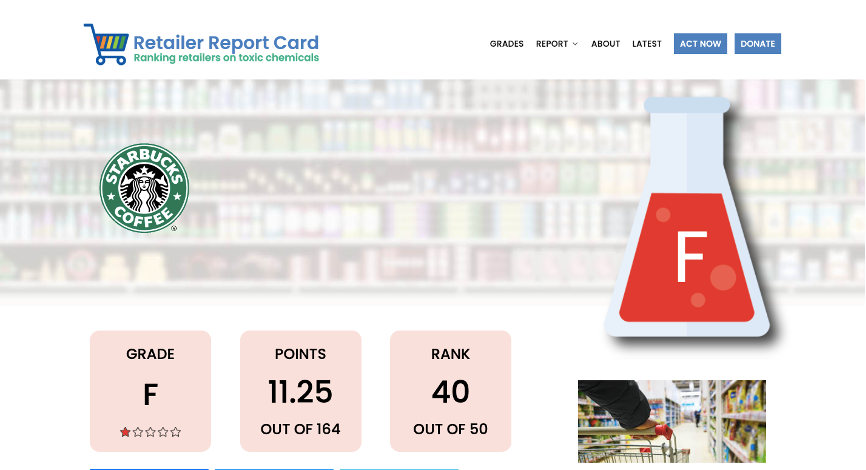Starbucks promises global stores will phase out food packaging containing PFAS by the end of 2023
On March 15, Starbucks announced a ban on perfluorinated chemicals, promising to eliminate packaging containing PFAS chemicals in Starbucks in the United States by the end of this year and eliminate PFAS packaging in global stores by the end of 2023. Starbucks' announcement comes years after Toxic-Free Future launched its Mind the Store campaign, which aims to phase out PFAS in retail food packaging.

PFAS is often used as a chemical to strengthen paper containers, which can effectively block water and oil from food, and its cost is low.
PFAS is a perfluorinated and polyfluorinated compound, and it is an artificial chemical. Because most of PFAS does not decompose, it can even wander in water and air for thousands of years. With the passage of time, it accumulates in the environment, animals and human beings, posing a serious threat to health. Even so, PFAS chemicals are often used in our daily life, including food packaging, such as takeout containers are the most common.

In August 2020, foreign media reported that PFAS was found in food packaging of McDonald's, Burger King and other major fast food restaurants. Subsequently, McDonald's and McDonald's China successively responded that there was no addition in China.
Many studies have shown that PFAS is associated with a series of health problems, such as renal and testicular cancer, liver and thyroid diseases, reproductive problems, hypertension caused by pregnancy, low birth weight, increased risk of birth defects, immune system effects and so on.
The PFAS-related ban is part of Starbucks' broader sustainable packaging strategy, which also includes the use of Forest Stewardship Council-certified paper. With Starbucks'in-depth implementation of the "sustainable" strategy, further optimization of disposable packaging, replacing disposable packaging with "reusable" packaging, is expected to eliminate PFAS; in all food packaging in US stores by the end of this year and PFAS in all food packaging in global stores by 2023. Starbucks has more than 15000 stores in the United States and more than 34000 stores worldwide.

After Starbucks announced the elimination of PFAS, the drug-free future issued a statement saying it is very pleased that Starbucks has joined the campaign and is committed to protecting its customers from PFAS, which may harm human health.
Starbucks previously received an F rating in 2018, 2019 and 2021 retailer reports, which are based on benchmark tests of retailers' chemical safety policies and implementation plans.


PFAS is widely used because of its low cost. Because of the serious threat to the environment and human health, Starbucks, Tims, McDonald's and other brands have made a commitment to eliminate PFAS. In order to achieve this arduous task, some researchers are trying to find alternatives. Among them, PBS can also have a good oil-proof effect, but the cost of using PBS is as much as five times that of PFAS.
Starbucks eliminated PFAS as well as disposable cups. Although the existence of disposable products provides convenience for human life, it has brought indelible harm to the environment and health. So, when you go out for coffee, you'd better bring your own cup.
Photo Source: Internet
For more information about coffee beans, please follow the coffee workshop (Wechat official account cafe_style) and exchange professional coffee knowledge. Please add Wechat account kaixinguoguo0925.
Important Notice :
前街咖啡 FrontStreet Coffee has moved to new addredd:
FrontStreet Coffee Address: 315,Donghua East Road,GuangZhou
Tel:020 38364473
- Prev

The truth! About how young people can't live without coffee! (coffee meme included)
(brain supplement cell phone alarm bell) Yes, that's right, your vacation is over! Hurry up! get up! go to work! We're going to be late! When I got up browsing Weibo and moments this morning, I saw the most posts: "I can't do it!" Hurry up and buy a cup of coffee and drink it! " I can see that everyone has also had a three-day holiday.
- Next

How much do Shanghainese love coffee? One bottle of coffee for canned meat!
According to the Shanghai Health Commission, from 0 to 24:00 on April 6, 322 new confirmed cases and 19660 asymptomatic infections were confirmed by COVID-19 in Shanghai, of which 15 were confirmed by previous asymptomatic infections, and 12 confirmed cases and 19027 asymptomatic infections were found in isolation and control.
Related
- The ceremony is full! Starbucks starts to cut the ribbon at a complimentary coffee station?!
- A whole Michelin meal?! Lucky launches the new "Small Butter Apple Crispy Latte"
- Three tips for adjusting espresso on rainy days! Quickly find the right water temperature, powder, and grinding ratio for espresso!
- How much hot water does it take to brew hanging ear coffee? How does it taste best? Can hot water from the water dispenser be used to make ear drip coffee?
- What grade does Jamaica Blue Mountain No. 1 coffee belong to and how to drink it better? What is the highest grade of Blue Mountain coffee for coffee aristocrats?
- What are the flavor characteristics of the world-famous coffee Blue Mountain No. 1 Golden Mantelin? What are the characteristics of deep-roasted bitter coffee?
- Can I make coffee a second time in an Italian hand-brewed mocha pot? Why can't coffee be brewed several times like tea leaves?
- Hand-brewed coffee flows with a knife and a tornado. How to brew it? What is the proportion of grinding water and water temperature divided into?
- What is the difference between Indonesian Sumatra Mantinin coffee and gold Mantinin? How to distinguish between real and fake golden Mantelin coffee?
- What does bypass mean in coffee? Why can hand-brewed coffee and water make it better?

